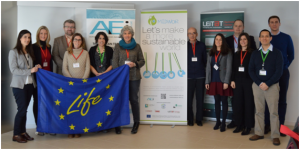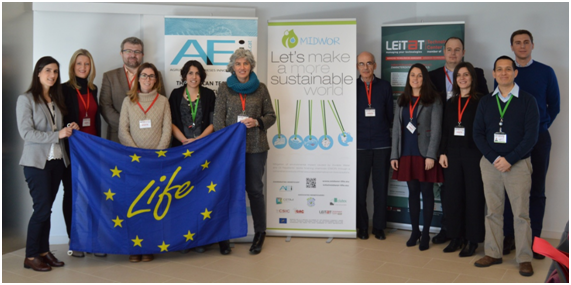Eco-friendly products for the textile industry should replace toxic ones in the future
 MIDWOR-LIFE aims to mitigate the environmental, health and safety impacts of current Durable Water and Oil Repellents (DWOR) and future alternatives by analyzing their environmental impact and technical performances in order to assess manufacturers on the best available technologies to provide repellency to liquids on textiles.
MIDWOR-LIFE aims to mitigate the environmental, health and safety impacts of current Durable Water and Oil Repellents (DWOR) and future alternatives by analyzing their environmental impact and technical performances in order to assess manufacturers on the best available technologies to provide repellency to liquids on textiles.
DWOR (Durable Water and Oil Repellents) are textile finishing products made of long chain fluorocarbon polymers to give repellency to water, oil and dirt to fabrics. These chemicals are persistent and bioaccumulative. Many perfluorochemicals have already been listed in different European regulations to put emphasis on their risk for humans and the environment.
These products have been used in the textile industry since many years ago and tentative to replace them has been done since 2000. Alternative products are currently proposed by different chemical companies for textile applications, however, the toxicity and environmental impact of these new alternatives is still unknown. The substitution of toxic and persistent perfluorochemicals is of high importance as they occupy a high place in the market and almost all alternatives are perfluorocarbons based products (fluorocarbons polymers with shorter chain length).
MIDROW-LIFE is a European project, cofounded by the European Community under the LIFE+ Financial Instrument within the axe Environment Policy and Governance and under the Grant Agreement n. LIFE14 ENV/ES/000670, which has the objective to mitigate the environmental, health and safety impacts of current DWORs and future alternatives by analyzing their environmental impact and technical performances in order to assess manufacturers on the best available technologies to provide repellency to liquids on fabrics. Moreover, the risks of the DWOR alternatives will be evaluated for human and environmental health in the textile finishing industry. In this perspective, policy recommendations will be set in order to promote the widespread implementation of the less toxic and most effective DWOR alternatives to fulfil REACH Regulation.
To achieve this objective, main activities to be carried out in MIDWOR-LIFE are: the selection of the current finishing additives and alternatives and the selection of the textile materials on which they are mostly applied, ii) the pre-industrial demonstration of the finishing applications, iii) the industrial demonstration of the finishing applications and iv) validation on site, at industrial scale of the risk assessment of the project finishing applications.
AEI TÈXTILS, a non-profit organization representing the Catalan technical textiles cluster is the coordinator of the project. The consortium is completed by another 5 partners: 3 research institutes/technological centers from Spain: LEITAT (member of Tecnio network), CETIM and the Institute of Advanced Chemistry of Catalonia from CSIC plus 2 technical textile clusters, POINTEX from Italy and CLUTEX from the Czech Republic.
The consortium had a monitoring meeting on 16th and 17th February in Terrassa, at LEITAT headquarters.
During the meeting, all MIDWOR-LIFE partners reviewed the activities which have been carried out from the start of the project on September 2015 and planned next steps to be performed during the upcoming months.
Next month, first results will be obtained: the selection of two current DWORs, seven alternatives and five types of fabrics; to be used to perform the pre-industrial and industrial tests.

